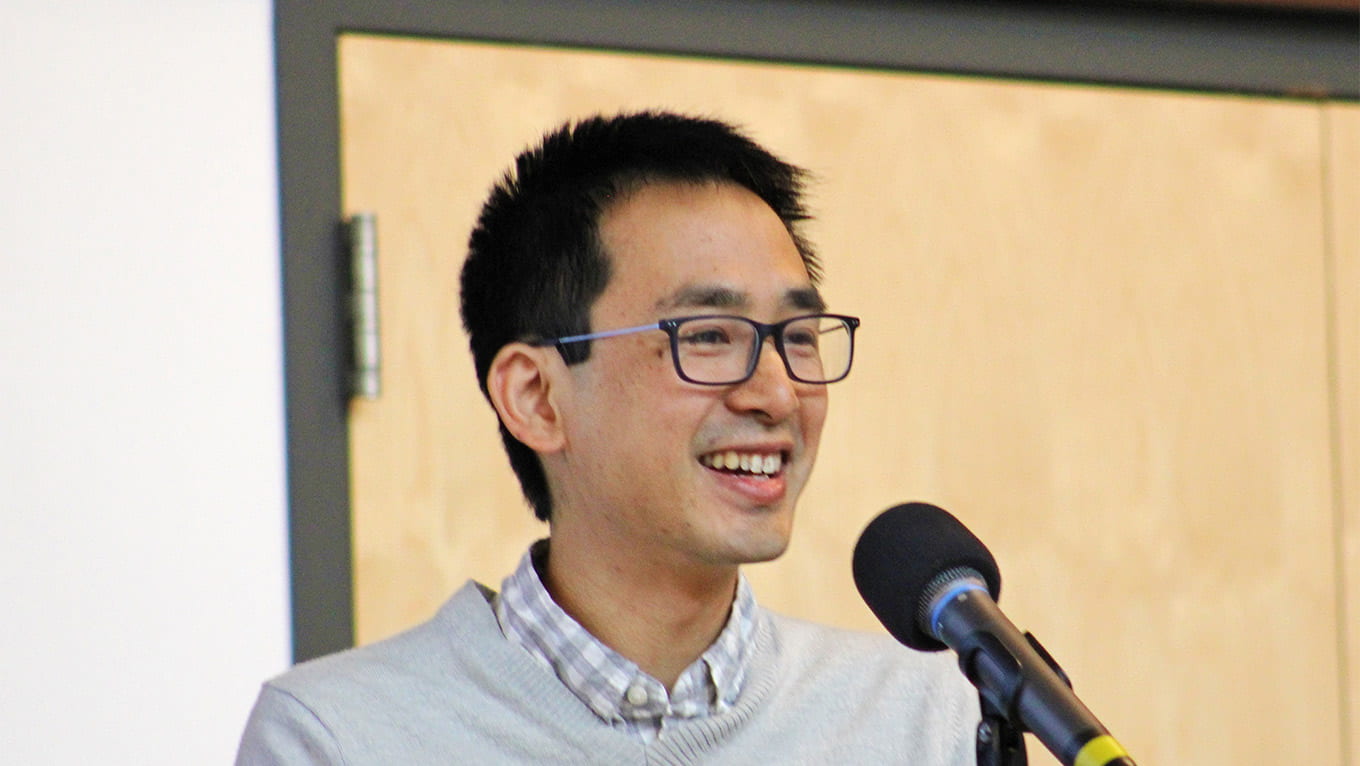
Last month, the Tech4Good Lab, led by Baskin School of Engineering Assistant Professor of Computational Media David Lee, held its first community luncheon, bringing together current and former members of the Tech4Good lab, community partners, and a group of local high school students.
The inaugural luncheon was an engaging opportunity to highlight meaningful student research projects and the various programs hosted by Tech4Good, a social computing research lab with a focus on experiential learning to develop technology for social good. It also allowed lab members to share insights with the extended UCSC community and brainstorm new ways to further community impact.
“So many people have been part of our journey in redesigning education to cultivate each person’s full contribution,” Lee said. “It was so exciting to be able to share the ideas and stories we all created together, and to strengthen our relationships.”
The luncheon kicked off with a talk by Doug Erickson, CEO of Santa Cruz Works, and was followed by student project presentations, which covered a wide range of student-focused research and innovation fostered in the Tech4Good Lab. The event concluded with discussions led by community partners Yvette Brooks, executive director of Your Future Is Our Business (YFIOB), and Jason Borge, CTO of the Santa Cruz County of Education.
From an easy and flexible, chat-based user interface to facilitate large group mentorship to a system that incorporates the use of AI to further peer collaboration in analyzing qualitative data and developing theory, the student projects presented underscored Tech4Good’s mission: to develop systems—integrating design, modeling, and algorithms—to support individual and societal flourishing in work, education, community engagement, and governance.

Undergraduate student Elizabeth Fonseca’s presentation highlighted the direct impact of community partnership. Fonseca’s team project “Better integrating #DayInALife videos towards career identity formation” came to fruition in the Technology and Information Management (TIM) 175: Business Strategy and Information Systems course, in which students partner with a community organization. The community partner for that course was YFIOB, a Santa Cruz-based organization that supports youth career exploration.
Through conversations with YFIOB members and volunteers, Fonseca and her team brainstormed new and engaging ways to get youth involved in career exploration. They noted that although social media platforms like TikTok are full of rich career content like day in the life videos, this content is not integrated in a way that supports youth career exploration. To address this, they designed a platform called ExploreCareers which synthesizes users’ exploration on social media with an intentional process for career identity formation.
In addition to supporting student projects that blend experiential learning and community engagement, the Tech4Good Lab is strongly committed to making research accessible to all students, especially those who are historically underrepresented in the fields of technology and engineering.
During the luncheon, Dustin Palea, a Ph.D. student in Lee’s lab, provided an overview of the “Exploratory reading groups designed for lightweight, scalable, and relational learning” project he and Lee implemented, which first began when Palea joined the lab as a second-year undergraduate student. The NSF-supported project aims to break down barriers to research opportunities and support undergraduate student creativity and motivation.
The project led to the successful creation of Research Explorations, a Baskin Engineering course delivered every quarter that exposes students from any major or background to the more creative and socially relevant aspects of computing and helps establish pipelines into faculty-led research labs.
Another way Tech4Good has forged new undergraduate student research pathways is through the Collaboratory, a one quarter, 10-hour-per-week commitment, where more than 200 students a year from all majors and interests with or without prior research experience can participate in research projects within real-world contexts. Each quarter has a new set of priorities and a range of projects to choose from, providing opportunities to gain valuable skills in areas such as web development, UI/UX design, user research, and machine learning.
“When I started Tech4Good six years ago, it was just a crazy dream and pretty risky as a new, untenured faculty,” Lee said. “So it feels so rewarding when students share the impact Tech4Good has had on them and so exciting to see us take our first steps towards a sustainable process for integrating research and experiential learning with community-engaged projects.”
To learn more about the Tech4Good Lab, including ways to get involved as a sponsor, please visit the lab’s website.
This block group hides your featured image, remove this block group to show your featured image again.
– SHARE THIS STORY –
You May Also Be Interested In
-

2025 Dean’s Awards highlight outstanding Baskin Engineering undergraduate research in AI, cybersecurity, biomedicine, and more
-

Baskin Engineering students sweep SC Launchpad 2025 awards in technology and social impact categories
-

First annual UC Open Summit highlights open source innovation in the UC system

